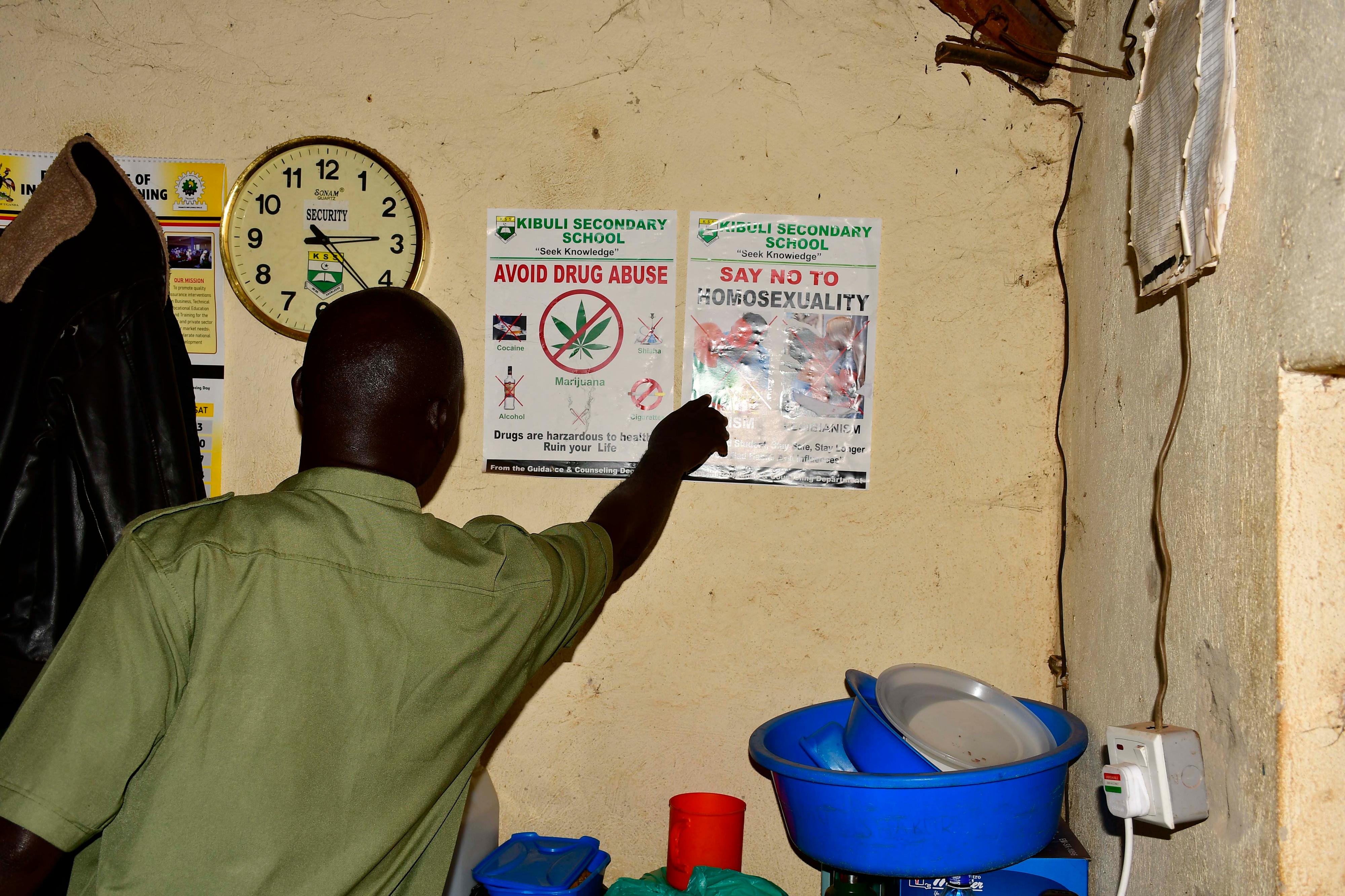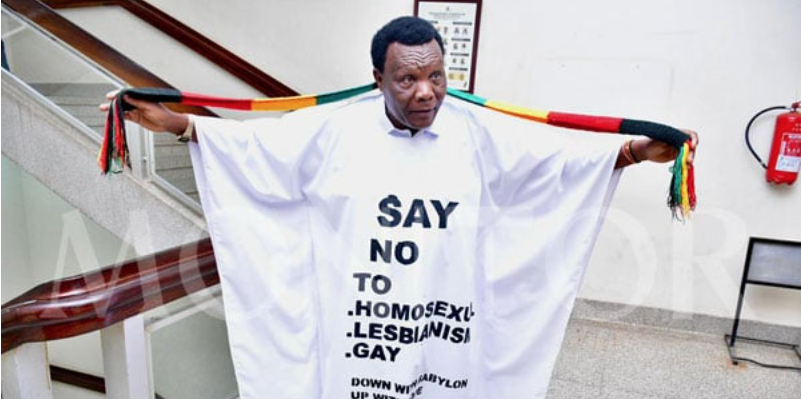Prime
New report paints violence surge post anti-homosexuality law enactment

A security guard points at posters warning against drug abuse and homosexuality at Kibuli SS, Kampala, on February 5, 2023. PHOTOS/ STEPHEN OTAGE
What you need to know:
- 180 incidents of evictions, displacement & banishments.
- 176 incidents of torture & cruel, inhuman or degrading treatment.
- 159 incidents of discrimination.
- 102 incidents of anxiety, panic attacks, suicidal ideation & depression.
A new report alleges a staggering rise in human rights violations against LGBTQ persons in the aftermath of the enactment of the Anti-Homosexuality law in May.
The report which documents cases pointing to evictions, torture, and blackmail, among others, is authored by the Strategic Response Team (SRT Uganda), a consortium of five entities operating in Uganda that actively documents and coordinates community response and referral mechanisms to providers of safe shelter, legal, safety, and protection services to LGBTIQ+ persons across Uganda.
“During the reporting period, real and perceived LGBTIQ+ persons were exposed, tortured, beaten, arrested, outed, and suffered physical, sexual, and psychological violence, including evictions and banishments, blackmail, loss of employment, and health service disruptions,” the report reads in part.
The report's authors say impacts of the law have been immediate.
“Service delivery to LGBTIQ+ persons, especially for sexual and reproductive health, became much more erratic and inadequate than before as now seeing a doctor risked being reported to the police. Many LGBTIQ+ struggle to find access to safe health services, including HIV testing and treatment,” the authors note.
In this way, they write, the new law is driving people who could benefit from needed healthcare away from such services. Unsurprisingly, there have also been rising numbers of mental health challenges, school dropouts, and people choosing to flee Uganda to seek asylum elsewhere.
The authors add: “Since the bill was first tabled in parliament, LGBTIQ+ persons experienced intensified violence and discrimination. As such, violations and abuses escalated and continue to escalate, compounded by social and traditional media sensationalizing arrests of LGBTIQ+ and parading people to humiliate them before the public. Local authorities and security agencies such as the Police have also conducted raids of LGBTIQ+ housing shelters and civic organizations.”
On May 2, Parliament passed the Anti-Homosexuality Act, and following parliamentary considerations of revisions proposed by President Museveni, the incumbent signed the bill into law on May 26. The law came into force on May 30.
Like its predecessor, which was nullified by the Constitutional Court in 2014 on technical grounds, activists argue that many provisions of the Anti-Homosexuality Act of 2023 blatantly violate rights to equality, non-discrimination, dignity, and privacy, among other rights, allowing intrusion into the private sexual lives of Lesbian, Gay, Bisexual, Transgender, and Queer plus persons (LGBTIQ+) persons.
Taking the lead, President Museveni has however rallied the country around the law and urged Ugandans to remain firm despite the fallout including with Uganda’s development partners.
The authors of the law further argue that the law provides a basis upon which LGBTIQ+ persons can be subjected to invasive searches, interrogations, and imprisonment as well as spurious and tortuous physical examinations.
“The phases of operationalization of the law after the presidential assent present clear sanctioning of violence against LGBTIQ+ people, and both state and non-state actors are actively violating rights of LGBTIQ+ people,” the authors say.
Pre-law
The violations, the report notes, were foreshadowed by persistent and organised efforts throughout 2022 and 2023 to silence organisations working with, on behalf of, or led by LGBTIQ+ persons.
For example, in August 2022, the government, through the Bureau for Non-Governmental Organizations (NGO Bureau), closed and suspended Sexual Minorities Uganda (SMUG) from operating on the allegation that SMUG “promoted homosexuality.” Then, in January 2023, a leaked document from the NGO Bureau listed over 20 organizations flagged for “promoting homosexuality.” Shortly after the Anti-Homosexuality Act was tabled in parliament and the crime of promoting homosexuality was codified. Many of the organizations listed have been harassed, attacked, and overshadowed with the threat of imminent closure.
Response
The World Bank, in response to the new law, on 9 August, announced that it was pausing all lending to Uganda “until the efficacy of the additional measures has been tested.
The European Union has, however, said the entity will not suspend financial aid to Uganda over the law because doing so would deprive vulnerable populations of vital support, a move that has been criticized by pro-gay activists.
“It remains critical for all funders of the Ugandan government to announce comprehensive reviews of all aspects of their funding to Uganda, and pause, redirect, reprogram, reduce and/or end funding to ensure that entities who advance and/or actively support the law cannot benefit from international assistance,” the report notes.
The report argues that coordinated bilateral action remains critical to the possible nullification of the law in the Constitutional Court. However, many governments have up to now done little more than issue condemnatory statements.
“The US, the EU, the UK, and other allied nations should be coordinating and working together to bring multilateral pressure on Uganda and announce not only their commitment to non-discrimination and economic inclusivity but also explain with precision how their donor money will be allocated in Uganda in ways that live up to those most critical principles,” the authors note.
The report makes specific recommendations to several entities including the Constitutional Court, the president, the Parliament, the police, the Uganda Law Reform Commission, the Uganda Human Rights Commission, the Equal Opportunities Commission (EOC), the NGO Bureau, and Civil Society Organizations and Uganda’s development partners like the United States and the European Union.
Human rights activist, Frank Mugisha reacted; “The law as the report shows has had heinous consequences on the lives of very many LGBT+ people. Amounting to so gruesome pain and torture for some. Spikes in cases of mental illness cases. It’s a bad time to be LGBTI+ people in Uganda. It’s unfathomable that the law was informed by nothing by conspiracies and misinformation fueled by some radical American evangelicals.”




